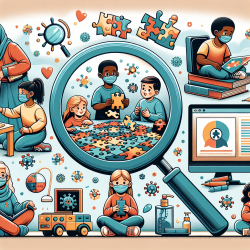Introduction
In the realm of speech-language pathology, the importance of interprofessional collaboration cannot be overstated. As practitioners dedicated to improving child outcomes, we must embrace data-driven insights that enhance our practice. The research article, An Interprofessional Standardized Patient Case for Improving Collaboration, Shared Accountability, and Respect in Team-Based Family Discussions, offers valuable lessons for practitioners seeking to refine their collaborative skills.
Key Insights from the Research
The study conducted by Kusnoor et al. (2019) highlights the significance of interprofessional education in fostering collaboration among healthcare professionals. The research involved 1,151 students from medicine, pharmacy, and nursing disciplines who participated in a standardized patient simulation. This exercise aimed to improve competencies in communication, shared accountability, and respect for diverse expertise.
Key findings from the study include:
- Improved Understanding: Participants reported a better understanding of the roles and perspectives of other disciplines, which is crucial for effective collaboration.
- Shared Accountability: The exercise emphasized the importance of shared responsibility in addressing medical errors, a concept that can be translated to speech-language pathology.
- Effective Communication: The study underscored the role of clear and respectful communication in team-based care, which is essential for successful outcomes in child therapy.
Implementing the Research Findings
For practitioners in speech-language pathology, integrating these findings into practice can lead to significant improvements in child outcomes. Here are some actionable steps:
- Foster Interprofessional Relationships: Engage with professionals from other disciplines to gain diverse perspectives and enhance collaborative efforts.
- Emphasize Shared Accountability: Encourage a culture of shared responsibility within your team, ensuring that all members are accountable for the outcomes of their collaborative efforts.
- Prioritize Communication Skills: Develop and refine communication strategies that facilitate clear and respectful interactions among team members and with families.
Encouraging Further Research
While the study provides a solid foundation for improving interprofessional collaboration, it also opens avenues for further research. Practitioners are encouraged to explore additional studies and engage in research initiatives that focus on enhancing team-based care in speech-language pathology.
By staying informed and actively participating in research, practitioners can continue to elevate their practice and contribute to the advancement of the field.
Conclusion
Incorporating the insights from the research by Kusnoor et al. (2019) into your practice can lead to transformative outcomes for children receiving therapy. By embracing interprofessional collaboration, shared accountability, and effective communication, practitioners can create a more supportive and successful environment for child development.
To read the original research paper, please follow this link: An Interprofessional Standardized Patient Case for Improving Collaboration, Shared Accountability, and Respect in Team-Based Family Discussions.










